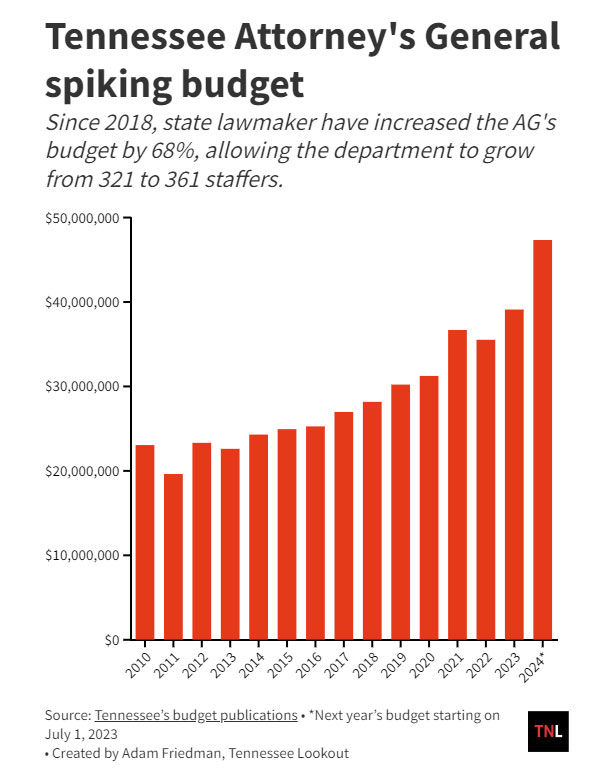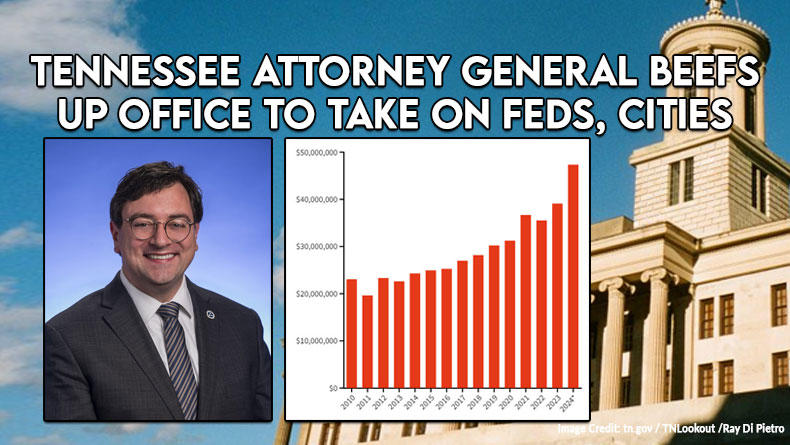Skrmetti’s 10-attorney “strategic litigation unit” also to focus on corporate activity.
Image Credit: tn.gov / TNLookout /Ray Di Pietro
By Sam Stockard [Tennessee Lookout -CC BY-NC-ND 4.0] –
Facing a spate of legal battles with Tennessee cities and the federal government, the Attorney General’s Office enters this year with a new “strategic litigation unit” and heftier budget.
As part of a $56.2 billion budget for fiscal 2023-24, the Legislature approved 10 more positions at a cost of $2.25 million for Attorney General Jonathan Skrmetti.
That gives the office a $52.95 million payroll for 363 positions with an average salary of $146,600. Including operating costs, the office’s budget will hit nearly $6.75 million on July 1, up almost 9% from this year’s total. The total includes $5.1 million from a market adjustment recommended by the Ernst & Young study conducted for executive department pay.
That figure also contains $5,078,500 for a grab bag of legal expenses such as filing fees, expert witness expenses and contracts, in addition to outside counsel on a wide variety of cases ranging from opioid litigation to TennCare investigations. The office spent $5 million on those items this fiscal year, matching the amount the state spent this year and $6 million in fiscal 2021-22.

The 10-attorney special unit was discussed in-depth during budget hearings, Chief of Staff Brandon Smith says, and will focus on “proactive litigation defending the separation of powers and the constitutional rights of Tennesseans, the defense of state laws presenting significant federalism issues, and pursue transparency and accountability for certain corporate activities that undermine the democratic process and harm consumers.”
Not a full year into the job, Skrmetti doesn’t necessarily have a different philosophy than his predecessor, Herbert Slatery, but appears to be taking a slightly more active role against what he considers federal incursions.
For instance, the Attorney General’s Office joined a national effort to stop President Joe Biden’s Administration from putting new regulations on ovens, stoves, dishwashers and refrigerators. Skrmetti also joined 23 states in requesting a court injunction on an Environmental Protection Agency rule to expand federal authority over bodies of water nationwide.
In yet another case, Skrmetti filed a brief with the U.S. Court of Appeals for the Fifth Circuit arguing against the Biden Administration’s attempt to make the abortion drug mifepristone available through the mail.
“Abortion is a matter of state law and Tennesseans, acting through their elected representatives, have chosen to prohibit elective abortions and to strictly regulate the use of abortion-inducing drugs such as mifepristone,” Skrmetti says.
The Attorney General’s Office also must deal with a challenge of the state’s new law prohibiting gender affirming care for minors, in addition to an injunction placed on the Legislature’s move to reduce the size of the Metro Nashville Council.
The Legislature’s critics, mainly House and Senate Democrats, are fond of saying the Republican-controlled chambers pass lawsuits, not legislation. Based on the Attorney General’s Office budget, they have a pretty solid argument.
Fresh off a three-year legal battle over the state’s Education Savings Accounts program, which provides public dollars to send low-income students to private schools, the state finds itself in another tussle with Metro Nashville over the new law to cut the Metro Council to 20 from 40. A state court judge put a temporary hold on that measure, forcing Skrmetti to issue a statement saying the state won’t appeal the decision but will allow the size of the council to take effect with the 2027 election.
Skrmetti contends the court left the 20-member cap on metropolitan councils intact when the majority concluded Metro’s plaintiffs are “not likely to succeed on their claim that it violates … the Tennessee Constitution.”
Metro Law Director Wally Dietz points out the trial court ruled unanimously that applying the council cut to this year’s election violates the Home Rule Amendment to the state Constitution. But while the court ruled 2-1 that Metro hasn’t proven its case on keeping the council at 40, the decision isn’t final.
Still expecting to prevail, Metro will make arguments against the cap that weren’t part of the initial injunction hearing. The court is expected to hold a hearing later this year.
Meanwhile, Metro Nashville’s legal office is concerned about other bills targeting the local government and is considering other possible lawsuits, according to Dietz. Those include measures to give top state officials control over appointments to the airport and sports authorities and dismantling a community oversight board that handles complaints against the police department.
Costs start to rise
Since Republican Gov. Bill Lee took office in 2019, the Attorney General’s Office has grown nearly every year.
The fiscal 2019-20 budget had 341 positions for former Attorney General Herbert Slatery with a $36.18 million payroll and $1.56 million spent on outside counsel, compared to $6 million a year ago.
In the final year of Democratic Gov. Phil Bredesen’s administration, the Attorney General’s Office had 341 positions with a total cost of $30.24 million, including $1.16 million in special litigation costs.
Early in Republican Gov. Bill Haslam’s tenure, the AG’s Office cut personnel to 320 with a payroll of $24.7 million and special litigation of only $1.83 million in fiscal 2012-13.
Since then, the number of attorneys working for the state has crept up, reflecting an increase in the amount of legal work.

Democratic lawmakers argue that much of the litigation is self-inflicted.
“It’s just the continued bad legislation that’s coming out of the General Assembly. I guess they need more attorneys to be able to defend the multiple lawsuits the General Assembly forces them into,” says state Rep. Bo Mitchell. “Whether it’s preventing children from getting health care to taking over the city of Nashville, it’s never-ending.”
Mitchell, a Nashville Democrat, says many of the attorney general’s tasks come at the direction of the Legislature.
“It keeps coming back to the same place,” he says.
In fact, the attorney general does take direction from the governor and legislative leaders.
Skrmetti, however, made the call on his own to reach an agreement with a California firearms organization to lower Tennessee’s gun-carry age to 18 from 21 under the permit-less carry law. He then consulted the state’s top leaders.
Rep. Charlie Baum, a member of the House finance committee, points out the Attorney General’s Office has a heavy workload, going after opioid distributors much as it once fought the tobacco industry, in addition to dealing with federal and local issues.
Skrmetti’s office recently announced Tennessee received a $163.9 million payment from major tobacco companies from a 1998 settlement that resolved the state’s lawsuit for violations of consumer protection laws and deceptive marketing practices. All told, the state has gotten $3.8 billion through the settlement.
The state also joins multiple lawsuits against the federal government where states are suing the federal government for items considered forms of “overreach” through its legislation and policies, Baum notes.
“These tend to be the red states that are the ones more apt to sue the federal government,” he says.
Baum also believes the state is running into higher legal costs, in part, because of “activist” judges, and he points toward the years-long litigation over private school vouchers as proof.
In that case, the Davidson County trial court and Tennessee Court of Appeals ruled the state violated the Home Rule Amendment by starting the voucher program in Metro Nashville and Shelby County school districts without getting local approval. The Tennessee Supreme Court, however, ruled in favor of the state using a technicality to enable the voucher program to take effect.


About the Author: Sam Stockard is a veteran Tennessee reporter and editor, having written for the Daily News Journal in Murfreesboro, where he served as lead editor when the paper won an award for being the state’s best Sunday newspaper two years in a row. He has led the Capitol Hill bureau for The Daily Memphian. His awards include Best Single Editorial from the Tennessee Press Association. Follow Stockard on Twitter @StockardSam



One Response
The TNGA has always been a joke. Both Democraps and RINOS being largely morons.
However, any effort to block any and all actions by the illegitimate Biden Regime is a worthwhile effort. No good can come from a leadership that hates its own country and citizens.